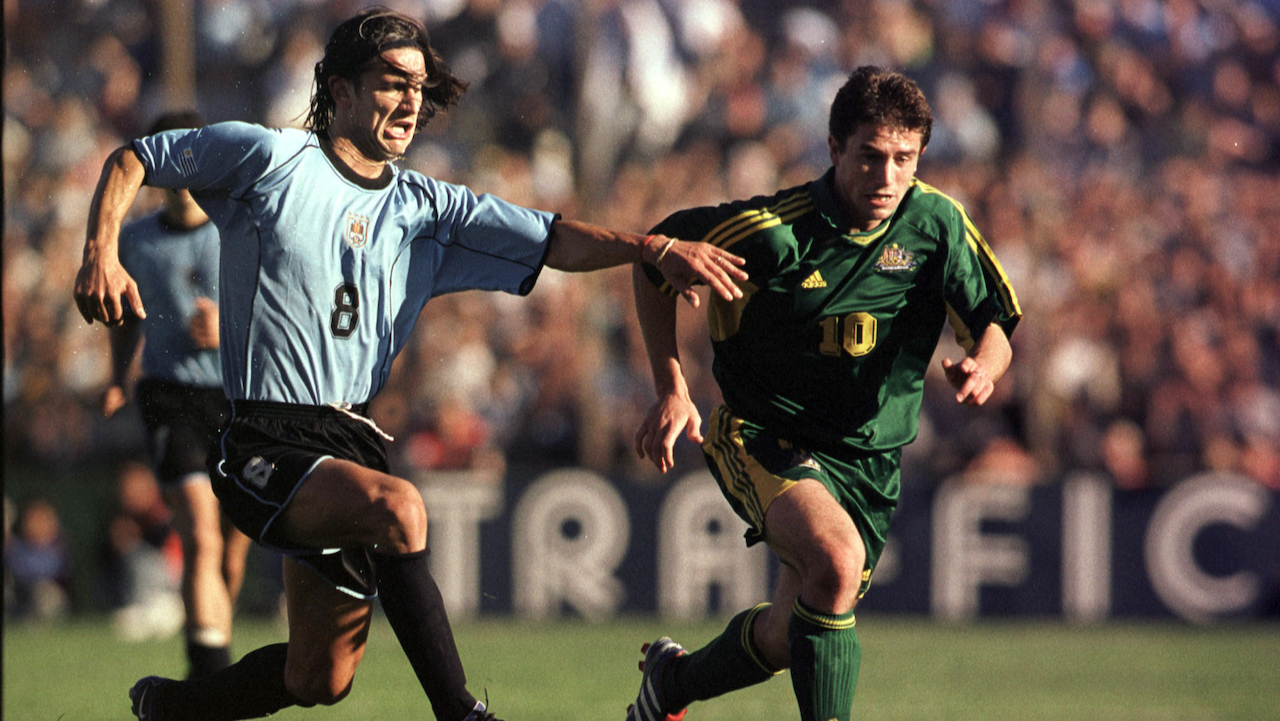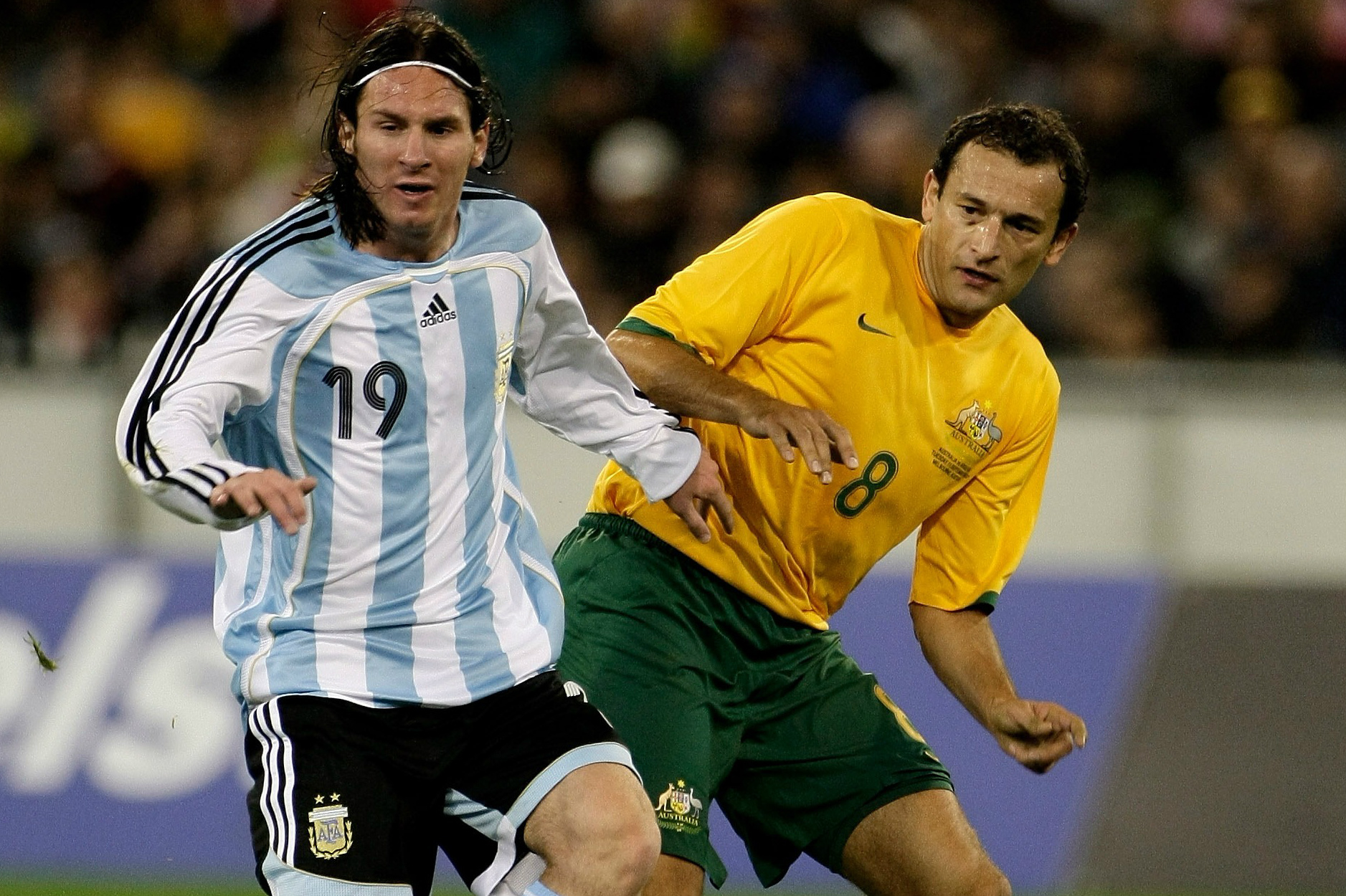Qualifying for World Cups isn’t meant to be easy - but throw in off-the-field subterfuge, dirty tricks and intimidation and it becomes even more daunting.
Those were the unforeseen obstacles which greeted the Socceroos when they touched down at Montevideo’s Carrasco Airport in November 2001, protecting a hard-earned 1-0 lead against Uruguay ahead of the second leg of their qualification playoff for Japan-South Korea 2002.
The travel-weary squad expected hiccups and holdups traversing customs - and there were exhaustive bag searches by stone-faced officials keen to play their part in extending a less than cordial welcome.
But it was in the arrivals hall were then coach Frank Farina’s travelling party found themselves the target of open hostility as a rent-a-thug mob of local heavies sprung an ambush, cursing, jostling and spitting at players as they waited for their luggage.

This was no spontaneous explosion of nationalism from La Celeste supporters - more a motley gathering of rabble rousers recruited by local business identities who stood to gain financially by Uruguay’s qualification.
Sowing doubt, fear and trepidation in the hearts and minds of Australian players was the aim of the ‘welcoming committee’, in a shabby sideshow which sparked a minor international incident with officials at the Australian Embassy across the River Plate in the Argentine capital of Buenos Aires placed on alert.
Midfielder Josip Skoko, who played in both legs, vividly remembers the antagonistic entrance into the elegant South American city, but insists it played no tangible part in Australia’s ultimate 3-0 defeat at Montevideo’s seething and monolithic Estadio Centenario several days later.
“Everything around the tie was tough, especially going there for the second leg,” he said. “We always knew they’d make it hard for us going into the country"

“They checked and double checked our bags and had us doing this and that. It’s part of what they did I suppose.
“Then there was that group who turned up and tried to make it uncomfortable as we were waiting to leave. It wasn’t nice and it was designed and pre-planned to be intimidating.
“It would have been frowned upon if we were to welcome a team to Australia in that way. That said, it was probably over-played by the media. While it was a bit confronting, we weren’t physically abused or roughed up.
“Maybe there was a bit of pushing and shoving, and screaming and yelling. I didn’t feel threatened as such but there was a feeling of ‘what’s going on here’?” I don’t think it had any real barring though on what happened afterwards.
“But it did create an environment (of hostility) and it was something that was designed to play in their favour.
“Could we have we been protected more (by authorities)? Absolutely because I don’t think we should have been put in that position.
“Afterwards we sort of laughed the whole thing it off a bit.”

Australia were escorted to their hotel, where they were minded by armed guards 24/7 whilst outside at night locals sought to disturb their slumbers by creating a din into the wee small hours.
“To be honest, I don’t think we were unduly rattled by circumstances there - it’s just that things didn’t go to plan on the pitch,” added Skoko.
“We weren’t out of it for most of the 90 minutes, and if a couple of things had gone differently we could easily have been at the World Cup. A mistake here and there was really all that changed our path.
“I don’t think we ever panicked and were right in it till the end.”
The febrile atmosphere inside a jammed Estadio Centenario - venue for the inaugural World Cup in 1930 - was something akin to depictions of ancient Rome during the era of the gladiators.
Resembling a colosseum with its steep terraces stretching up towards the heavens, the arena was a bellowing cauldron of sky blue with nary a hint of green and gold in sight.
There were thumping sound systems at either end of the ground, pumping out ear-splitting salsa music.
The party went into full swing when Dario Silva - left at home for the first leg - equalised early in the first half to make the score 1-1 on aggregate to turn the blowtorch up a notch.
Australia’s resistance was broken when Richard Morales scored with 20 minutes to go, adding a third in stoppage time as the Socceroos opened up in search of a breakthrough at the other end which to would have made it 2-2 and taken them through on the away goals rule.
“It was a tough atmosphere - the noise was deafening at times,” continued Skoko. “But we played against Iran in Tehran (four years earlier) and that was probably twice as loud and twice as intimidating.
“But, for sure, it was crazy.”

Having spent two seasons playing in the hothouse of the Turkish domestic league, Skoko was no stranger to hostility and animosity on a grand scale.
“We’d (Genclerbirligi) play away at Fenerbahçe and it was something else - you’d get showered with missiles from the stands, the team bus would get rocks thrown at it plus a lot of other things as well,” he said.
“And I remember being on the bench in Iran being scared to even warm up (for the playoff first leg in 1997 which finished 1-1).”
Revenge was sweet under Guus Hiddink in 2005 when Australia turned the tables on Uruguay to qualify for the World Cup in Germany, with
Skoko declaring: “The planning was a lot easier because you knew what to expect (second time around).
“We had the template there - we just had to fill in the gaps. Our team on both occasions was very strong.
“But having the second leg at home was an advantage and I think a little bit luck was also on our side on that occasion.”
